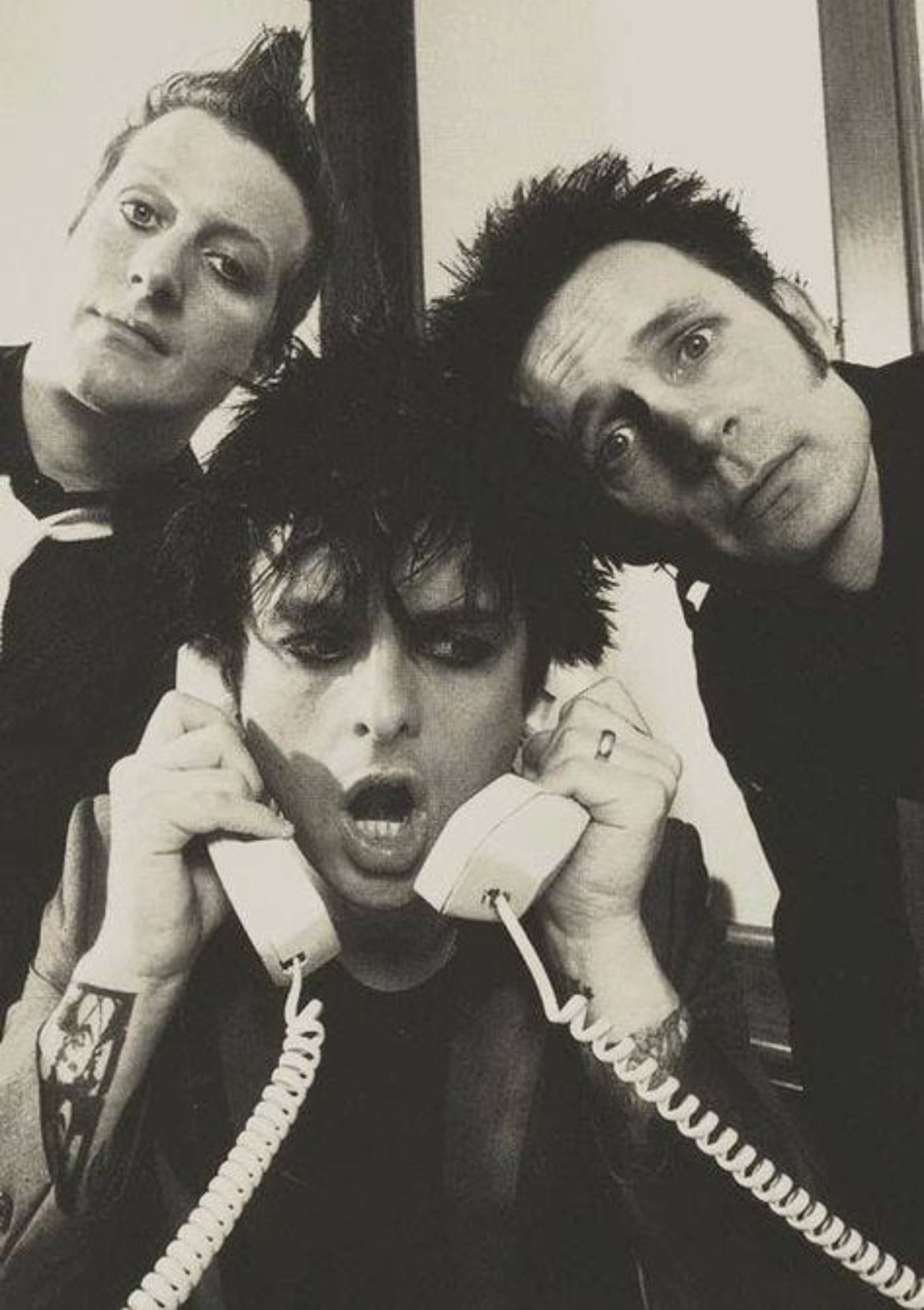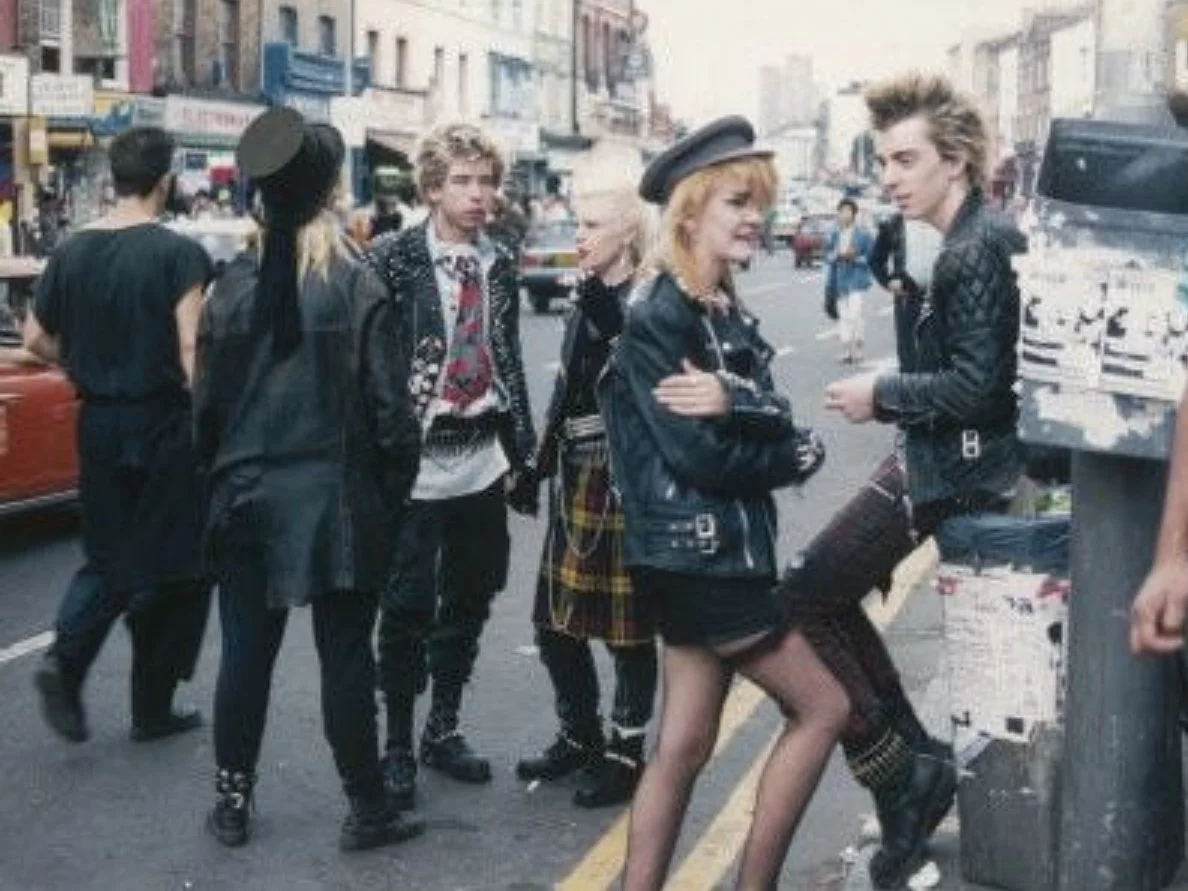Punk’s Not Dead
By Natalie McCarty
The punk movement, often synonymous with rebellion and anti-establishment sentiments, has withstood the changing of times, the societal issues, and the music culture of several decades, proving time and again that punk is far from dead. From its explosive origins to its ever-evolving presence in modern culture, punk continues to challenge and redefine the boundaries of music, fashion, and societal norms.
Joan Jett; Image Sourced through Pinterest
The Origins of Punk
Punk rock emerged in the mid-1970s, a fiery and guttural response to the perceived excesses and pretensions of mainstream rock music. Rooted in the gritty urban landscapes of New York City and London, punk was both a genre and a subculture, characterized by its fast-paced, three-chord music and its DIY ethic.
In the United States, the seeds of punk were planted by bands like The Ramones, who played their first gig at New York’s iconic CBGB in 1974. Their short, fast, and loud songs stripped rock to its raw essentials. Across the Atlantic, the Sex Pistols and The Clash were igniting a similar revolution in the UK, their music infused with political anger and a desire to provoke and shock.
Fugazi; Image Sourced through Pinterest
The Evolution of Punk
As punk spread, it morphed and diversified, influencing and giving rise to various sub-genres and movements. The late 1970s and early 1980s saw the advent of hardcore punk in the U.S., with bands like Black Flag and Minor Threat leading the charge. Hardcore was faster paced, more aggressive, and often more politically charged than its predecessor.
Minor Threat Poster; Image Sourced through Pinterest
The 1980s also witnessed the rise of post-punk, a genre that retained punk’s ethos but experimented with more complex sounds and introspective lyrics. Bands like Joy Division and Siouxsie and the Banshees expanded the sonic and emotional range of punk, paving the way for alternative and indie rock.
Siouxsie Sioux; Image Sourced through Pinterest
The 1990s marked a significant resurgence of punk with the mainstream success of bands like Green Day and The Offspring, who brought punk’s energy and ethos to a new generation. This period, often referred to as the punk revival, blended the rawness of 70s punk with catchy melodies and polished production.
Green Day; Image Sourced through Pinterest
Key Players in Punk’s Legacy
Several iconic figures have been instrumental in shaping and sustaining the punk movement:
The Ramones; Image Sourced through Pinterest
The Ramones: Often dubbed the “godfathers of punk,” their straightforward, high-energy approach laid the foundation for punk music.
Sex Pistols; Image Sourced through Pinterest
Sex Pistols: Their chaotic career and provocative antics, especially through frontman Johnny Rotten, made them the poster children of punk rebellion.
The Clash; Image Sourced through Pinterest
The Clash: Known for their political lyrics and willingness to experiment with different genres, they showed that punk could be both profound and diverse.
Green Day; Image Sourced through Pinterest
Green Day: Their 1994 album “Dookie” brought punk to a mainstream audience, proving its enduring appeal.
Image Sourced through Pinterest
Women in Punk
Women have played a crucial role in punk, challenging gender norms and making significant contributions to the movement’s music, style, and ethos. From the early days of punk to its contemporary iterations, female artists and bands have had an equal hand in changing the industry–as well as leaving an indelible mark on its history.
Patti Smith; Image Sourced through Pinterest
Patti Smith: Often called the “punk poet laureate,” Smith’s 1975 album “Horses” melded rock and poetry, setting the stage for punk’s lyrical depth and intensity.
Debbie Harry; Image Sourced through Pinterest
Debbie Harry: As the frontwoman of Blondie, Harry combined punk attitude with pop sensibility, helping punk reach a broader audience without losing its edge.
The Slits; Image Sourced through Pinterest
The Slits: This all-female punk band from the UK, led by Ari Up, broke boundaries with their raw sound and fearless performances, addressing issues of gender and society head-on.
Siouxsie Sioux; Image Sourced through Pinterest
Siouxsie Sioux: Leading Siouxsie and the Banshees, Siouxsie Sioux was a pioneer of post-punk, known for her distinctive voice, style, and innovative music.
Kathleen Hanna; Image Sourced through Pinterest
Kathleen Hanna: In the 1990s, Hanna and her band Bikini Kill were at the forefront of the Riot Grrrl movement, which combined punk music with feminist activism, creating a powerful platform for women’s voices in punk.
Image Sourced through Pinterest
Punk Today: An Enduring Influence
Today, the spirit of punk is thriving in countless forms around the world. As someone deeply immersed in punk culture, my style draws heavy inspiration from the legends of the ’80s. I proudly represent and collaborate with numerous clients who are also deeply embedded in the punk scene.
The DIY ethic that punk popularized has been adopted by countless artists, from bedroom musicians to indie filmmakers. The internet has democratized music production and distribution, echoing punk’s original ethos of accessibility and anti-commercialism.
Image Sourced through Pinterest
The punk fashion aesthetic — characterized by leather jackets, band tees, and DIY accessories — remains influential in mainstream and subcultural fashion alike.
Moreover, punk’s impact is evident beyond music. Punk-inspired art, literature, and zines continue to challenge societal norms and champion individual expression. Activism and punk are often intertwined, with punk music serving as a rallying cry for various social and political causes.
Image Sourced through Pinterest
Conclusion
Punk has never been just a genre of music; it’s a rebellion against the status quo. From its raw beginnings in the 1970s to its myriad of modern influences and commentaries, punk’s defiant spirit remains a powerful force.
Sid Vicious and Nancy Spungen; Image Sourced through Pinterest
As long as there are voices yearning to be heard and systems to be challenged, punk will never die.



















